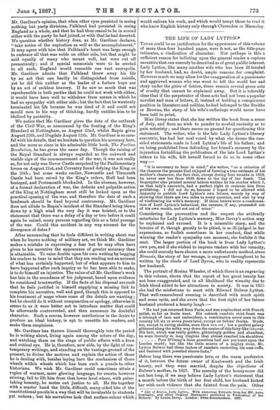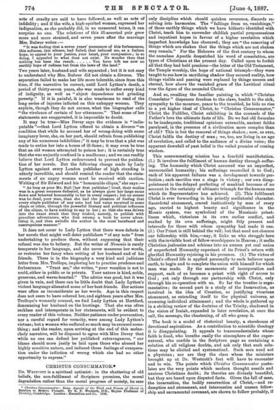THE LIFE OF LADY LYTTON.•
THERE could be no justification for the appearance of this volume of more than four hundred pages, were it not, as the title-page intimates, a vindication of character. Nor perhaps is this a sufficient reason for inflicting upon the general reader a copious narrative that can scarcely be described as of great public interest. Lady Lytton, like many another wife who has been ill-treated by her husband, had, no doubt, ample reasons for complaint. However much we may allow for the exaggeration of a passionate and aggrieved woman who was wont to tell the world her sad story under the guise of fiction, there remain several gross acts of cruelty that cannot be explained away. But it is tolerably clear that if the perpetrator of these acts had not been a popular novelist and man of letters, if, instead of holding a conspicuous position in literature and politics, he had belonged to the Smiths or Browns, the story of his wife's sufferings would never have been told in print.
Miss Davey states that she has written the book from a sense of duty, and from no wish to pander to morbid curiosity or to gain notoriety ; and there seems no ground for questioning this statement. The writer, who is the late Lady Lytton's literary executrix, has had her soul vexed by what she deems the one- sided statements made in Lord Lytton's life of his father; and on being prohibited from defending her friend's memory by the injunction forbidding the publication of the late Lord Lytton's letters to his wife, felt herself forced to do so in some other way
It is necessary to bear in mind," she writes, "as a criterion of the chances the present Earl enjoyed of forming a tree estimate of his mother's character, the fact that, except during four months in 185$, he never saw her from 1838 down to the day of her death. The biographer also printed several letters written by his mother which I, as that lady's executrix, had a perfect right to restrain him from pabliahing. I did not do so, because I hoped to be allowed with impunity to publish Lord Lytton's own letters, merely by way of showing that there are two sides to every question, and also by way of vindicating his wife's memory. If these letters were a condemna- tion of Lord Lytton's behaviour, the censure, if any, proceeded out of his own mouth, and not out of mine."
Considering the provocation and the respect she evidently entertains for Lady Lytton's memory, Miss Devey'e action may be explained and excused. It is a miserable story, and the heroine of it, though greatly to be pitied, is so ill-judged in her expressions, so foolish sometimes in her conduct, that while winning the reader's sympathy one moment, she forfeits it the next. The larger portion of the book is from Lady Lytton's own pen, and if she wished to impress readers with her veracity, she could scarcely have chosen a more unfortunate method, since Nemesis, the story of her wrongs, is supposed throughout to be written by the shade of Lord Byron, who in reality represents her husband.
The portrait of Rosina Wheeler, of which there is an engraving in this volume, shows that the report of her great beauty has not been exaggerated, and in all likelihood the vivacity due to Irish blood added to her attractions in society. It was in 1825 she had the misfortune to meet with Edward Bulwer Lytton. That well-remembered evening is described with much spirit and some spite, and she avers that the first sight of her future husband produced a hearty laugh
:- "He had just returned from Paris, and was resplendent with French polish, so far as boots went. His cobweb cambric shirt-front was a triumph of lace and embroidery, a combination never seen in this country till six or seven years later, except on babies' frocks. Studs, too, except in racing stables, were then non eat; but a perfect galaxy glittered along the milky way down the centre of this fairy-like lingerie. His hair, which was really golden, glitteringly golden and abundant, he wore literally in long ringlets that almost reached his shoulders.
Poor D'Orsay'a linen gauntlets had not yet burst upon the London world ; but like the little source of a mighty river, Mr. Lytton Sulwer had three inches of cambric encircling his coat cuffs, and fastened with jewelled sleeve-links,"
Before long there was passionate love, or the warm profession of it, between the future owner of Knebworth and the Irish beauty, and they were married, despite the objections of Bulwer's mother, in 1827. The serenity of the honeymoon did not last long, if we may believe Lady Lytton's statement that a month before the birth of her Bret child, her husband kicked her with such violence that she fainted from the pain. Other
bi• Life of Bosnia, Lady Lytton. With numerous Extracts from her MB. Leto. biography, and other Original Documents published in Vindication of her Memory. By Louisa Devey. London Swan Bonnenschein. UV.
acts of cruelty are said to have followed, as well as acts of infidelity ; and if the wife, a higb•spirited woman, expressed her indignation, as she probably did, in no measured terms, it can surprise no one. The relations of this ill-assorted pair grew more and more strained, and seven years after the marriage Mrs. Bulwer writes
:- "It was finding that a seven years' pursuance of this forbearance, this softness, this silence, had failed, that induced me, as a forlorn hope, to appeal to your justice, your heart, your compassion ; in no doing, I appealed to what does not exist. No wonder then that
nothing has been the result You have left me now no earthly hope of redress but from the laws of the land."
Two years later, husband and wife separated ; but it is not easy to understand why Mrs. Balwer did not obtain a divorce. The separation failed to make her life more tolerable, since from this time, if the narrative be correct, until Lord Lytton's death, a period of thirty-seven years, she was made to suffer every kind of indignity, as well as " abject dependence and grinding poverty." If it is painful, it is also wearisome to read of the long series of injuries inflicted on this unhappy woman. They explain, though they do not excuse, what the biographer calls "the virulence of certain of her utterances." That some of her statements are exaggerated, it is impossible to doubt.
It may be true—Miss Devey Bays the evidence is " indis- putable "—that Lord Lytton offered to obtain a divorce "on condition that while he accused her of wrong-doing with some imaginary lover, she, on her part, should refrain from publishing any of his numerous infidelities ;" it may be true that a plot was made to entice her into a house of ill-fame ; it may even be true that an old woman attempted to poison her ; it is certainly true that she was unjustly confined in a madhouse ; and we can readily believe that Lord Lytton endeavoured to prevent the publica- tion of her novels. But the following charge made by Lady Lytton against every London publisher of high standing is utterly incredible, and should remind the reader that the state- ments of an angry woman must be received with caution. Writing of Sir Edward and his " honourable clique," she says :—
" As long as poor Mr. Bull [her first publisher] lived, their malice was in a great measure defeated, as he always gave her large same down and behaved honourably to her in every respect; but no sooner was he dead, poor man, than she had the pleasure of finding that every single publisher of any note bad had value received in some shape or other, through the powerful literary and political influence of the clique, to have nothing to say to her ; so that she was driven into the exact strait that they wished, namely, to publish with penniless adventurers, who first swamp a book by never adver- tising it, and then swindle the author in the most barefaced and unscrupulous manner."
It does not occur to Lady Lytton that there were defects in her novels that might well deter publishers " of any note " from undertaking to produce them, without supposing that their refusal was due to bribery. Bat the writer of Nemesia is rarely temperate in her language, and she never measures her words, or restrains her fancy when writing of her husband and of his friends. There is in the biography a very kind and judicious letter from Mrs. Trollope, imploring her to practise prudence and forbearance. "Trust me," she writes, "your vocation is not to scold, either in public or in private. Your nature is kind, noble, generous, and warm-hearted." The advice was good, but it was given in vain, and there can be little doubt that Lady Lytton's violent language alienated some of her best friends. Her actions were often as inconsiderate as her words. Age in this respect does not seem to have sobered her, and eighteen years after Mrs. Trollope's womanly counsel, we find Lady Lytton at Hertford, denouncing her husband on the hustings. That she was often reckless and intemperate in her statements, will be evident to every reader of this volume. Neither patience under provocation, nor a careful regard for veracity, were among Lady Lytton's virtues; but a woman who suffered so much may be excused some- thing; and the reader, upon arriving at the end of this melan- choly narrative, will be disposed to agree with Miss Devey that while no one can defend her published extravagances, " our blame should more justly be laid upon those who abused her highly sensitive nature, and induced those feelings of exaspera- tion under the infliction of wrong which she bad no other opportunity to express."



































 Previous page
Previous page